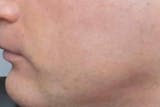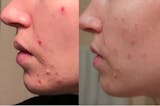Identifying and avoiding triggers helps reduce the frequency and severity of eczema flare-ups.
Triggers vary from person to person, and recognizing them enables tailored strategies for better skin health.
Eczema is a chronic skin condition characterized by periodic acute flares, marked by red, itchy, and inflamed skin. The severity and duration of an acute eczema flare is influenced by three main factors:
Identifying and avoiding eczema triggers is a crucial step in managing the condition and reducing the frequency and severity of flare-ups. Each person's experience with eczema is unique, and their specific triggers may vary.
By recognizing the factors that exacerbate their symptoms, individuals can develop personalized strategies for avoiding and overcoming these triggers, ultimately leading to healthier skin and improved quality of life.
In this article, we will provide a brief overview of common eczema triggers and delve into practical tips for minimizing their impact on your skin.
JUMP TO SECTION:
The Different Eczema Triggers
Eczema triggers can be diverse, ranging from stress to environmental factors, dietary, and other less common triggers. Identifying your specific triggers is an essential step in managing your eczema effectively. To learn more about each trigger, please refer to the following pages:
Stress, both physical and emotional, can negatively impact the immune system and trigger or worsen eczema symptoms.
Environmental factors such as pollution, humidity, and temperature changes can influence eczema symptoms.
Food can contain allergens, intolerances, and other stressors.
Allergens are substances that trigger an immune response, causing inflammation and worsening eczema symptoms. Intolerances can create stress in the body and lead to an immune response as well.
Irritants are substances that can cause skin inflammation and exacerbate eczema symptoms.
Hormonal fluctuations, such as those experienced during pregnancy, menstruation, or menopause, can trigger eczema flare-ups.
Once you know which triggers are relevant to your condition, you can tailor trigger avoidance to maximize effectiveness and minimize impact on your life. Read on for actionable strategies to avoid common eczema triggers.
Practical Tips for Avoiding Eczema Triggers
Common eczema triggers include irritants, allergens, stress, environmental factors, pathogens, hormonal changes, and UV exposure. We are going to take them one-by-one and share tips to get started in managing them.
We start with how to identify which triggers are most important to you.
Identifying Your Personal Triggers
By pinpointing the factors that contribute to your flare-ups, you can develop a targeted approach to avoiding these triggers and improving your skin's health. Here’s how!
Keeping a Symptom Journal
To determine your specific eczema triggers, consider maintaining a symptom journal. Document your daily activities, the products you use, the foods you eat, and any changes in your environment. Note any flare-ups or worsening of symptoms, and look for patterns or correlations between these factors and your eczema.
We have a guide on how to make that a little easier.
Allergy Testing
Consulting with an allergist or dermatologist can provide valuable insights into potential allergens that may be contributing to your eczema symptoms. They may recommend skin patch testing, blood tests, or other diagnostic tools to identify allergens.
We go into more detail here.
Minimizing Exposure to Eczema Irritants
Certain chemicals and irritants found in everyday products can trigger eczema flare-ups. The common culprits are detailed here. To minimize exposure:
Wear protective clothing when handling irritants and cover exposed surfaces when there are irritants in the air.
Wash your skin and clothing as soon as possible after exposure, following the guidelines on our washing with eczema page.
Choose toiletries and household products designed for sensitive skin, primarily avoiding fragrances and artificial colorings.
Opt for skin-friendly fabrics and clothing made from soft, breathable fabrics like cotton or bamboo, which are less likely to irritate the skin. Avoid wearing rough or synthetic materials, such as wool or polyester, that can exacerbate eczema symptoms.
Make sure your clothing is loose-fitting and comfortable to prevent friction and irritation.
By minimizing exposure to these irritants, you can reduce the chances of experiencing an eczema flare-up and better manage the factors that cause eczema flare-ups in your daily life.
Reducing Allergen Exposure When You Have Eczema
Reducing exposure to allergens is a critical aspect of managing eczema and preventing flare-ups. In this section, we will provide practical tips for creating an allergen-free environment and embracing an allergy-friendly diet.
Reducing Dust Mite Exposure with Eczema
Dust mite allergies can exacerbate eczema symptoms, as the microscopic mites and their feces are common household allergens. To minimize exposure to dust mites and their allergens, consider the following tips:
Use a vacuum cleaner with a HEPA filter to reduce dust build-up.
Vacuum floors at least twice a week.
Avoid direct skin contact with items that accumulate dust, such as cushions, fabric sofas, rugs, carpets, and soft toys. Use a clean sheet to cover these areas or wear long sleeves when relaxing.
If possible, minimize carpeted areas in your home and opt for hard flooring instead.
Reduce clutter and ornaments that collect dust.
Control humidity in your home to discourage dust mite activity - Low humidity is preferable but be mindful of the potential for dry air to exacerbate skin dryness.
Use a foam mattress instead of a spring one, as dust can build up in the cavities of the latter.
Air out and beat your mattress on dry, sunny days.
Use non-allergenic mattress and bedding covers.
Wash cotton bedding at high temperatures (above 140 degrees Fahrenheit or 60 degrees Celsius) to remove dust mites.
Regularly dust your home with a damp cloth to prevent dust build-up.
Reducing Pet Allergy Exposure with Eczema
Animal allergies can trigger eczema flare-ups. See the allergy testing and tracking pages to learn how to identify which animals you might be allergic to. To minimize exposure to allergens from animals:
Wash any areas of skin or clothing that have been in contact with allergens.
Avoid touching or getting too close to animals or items they have come into contact with.
If you want to have a pet but are concerned about allergies, consider less allergenic breeds.
If you already live with a pet you are allergic to, limit the pet's access to areas where you spend most of your time.
Vacuum frequently with a high-quality vacuum cleaner with a HEPA filter.
An air purifier installed in your home could reduce the airborne allergens.
Embracing an Allergy-friendly Diet
Some individuals may experience eczema flare-ups as a result of food allergies or intolerances. To manage food-related eczema triggers:
Identify and avoid triggering foods, replacing them with nutritionally comparable alternatives. Consider the tools available in the tracking page to target your energy.
When traveling, consider preparing your own food so you know what you are consuming. When abroad, carry a translation of your food allergies or intolerances to ask about ingredients in different languages.
Consult a registered dietitian or nutritionist for personalized guidance on creating a balanced, eczema-friendly diet.
See the diet and nutrition page to learn more about how food can be used to improve the skin.
Coping with Stress
Stress can act as an eczema trigger, as it weakens the immune system and aggravates the skin's inflammatory response. To manage stress-related eczema, consider the following tips:
Identify the sources of stress in your life, such as work, relationships, or personal issues and consider whether you can reduce the exposure or your sensitivity to each individual stressor
Communicate with friends, family, and trusted confidants to explore and address these stressors.(CHA 2021)
Develop healthy coping mechanisms, such as exercise, meditation, or engaging in hobbies.
Seek professional help, such as therapy or counseling, if necessary.
Keep in mind that it is impossible to eliminate all stress from your life, but developing healthy ways to manage it can help reduce eczema flare-ups. Learn more about mental wellbeing tools and how to exercise with eczema.
Managing Environmental Factors
Various environmental factors can trigger eczema, and understanding how to minimize exposure to these elements is crucial for managing the condition. The triggers are detailed more in the environment page. Below, we outline some common environmental triggers and suggest practical ways to avoid them.
Adapting to Weather and Climate Changes
Poor air quality, such as high pollution levels or exposure to airborne allergens, can irritate the skin, affect the skin’s microbiome and exacerbate eczema. To improve air quality and minimize exposure to irritants:
Monitor weather and air quality forecasts, and plan outdoor activities accordingly.
Avoid spending long periods of time in high pollution areas, such as busy roads or city centers. Consider covering the skin and wearing a mask if exposure cannot be avoided.
Use air purifiers to remove particulates from the air in your home or workspace.
Rinse your skin if you have been exposed to high levels of pollutants. Refer to the [washing] page to learn more about eczema-safe cleaning.
Ensure proper ventilation when working with chemicals, paints, or burning materials.
Keep your skin well-moisturized during dry, cold weather by applying a fragrance-free, hypoallergenic moisturizer regularly. Use a humidifier in your home to maintain optimal humidity levels and prevent skin dryness.
During hot weather, stay in air-conditioned environments and wear lightweight, breathable clothing to reduce sweating and skin irritation.
Maintaining Humidity Levels
Extreme temperature and humidity levels can trigger eczema flare-ups. To manage these factors:
Regulate temperature and humidity at home with air conditioning or humidifiers, as needed, aiming for room temperature with relative humidity between 40 and 60%.
Dress appropriately for the weather, wearing breathable fabrics and using layers for temperature control.
Shield your skin from cold winds and long periods of time in direct sunlight.
Moisturize regularly, especially in cold or low-humidity environments or at higher altitudes.
Avoid overheating during hot weather and stay hydrated. Consider wearing multiple thin layers to enable the control.
Be mindful of how sweaty you are, wash in cool water if you are sweaty and this is triggering your skin.
Regularly clean and maintain your humidifier to prevent the growth of mold and bacteria.
Preventing Pathogen-Related Flare-Ups
Bacterial, viral, and fungal infections can exacerbate eczema symptoms, leading to discomfort and increasing the risk of complications. Here are some tips to avoid that.
Practicing Good Hygiene
Good hygiene practices are essential for preventing infections that can exacerbate eczema. Wash your hands frequently with gentle, fragrance-free soap and water, and avoid touching your face or eczema-prone areas. Keep your nails short and clean to minimize skin damage from scratching. Clean and sanitize objects and surfaces that you frequently touch, such as cell phones, keyboards, and doorknobs.
Seeking Medical Treatment for Infections
If you suspect an infection in your eczema-affected skin, consult with a healthcare professional promptly. Early detection and treatment can help prevent the infection from worsening and causing further damage to your skin. Follow your healthcare provider's advice on proper wound care and medication use to promote healing and reduce the risk of complications.
Addressing Hormonal Changes
Be aware of how hormonal changes during pregnancy, menstruation, or menopause may affect your eczema symptoms. If you notice a pattern, discuss it with your healthcare provider, who can provide guidance on managing hormonal fluctuations and their impact on your eczema.
In some cases, hormonal therapy or adjustments to your skincare routine may be recommended.
UV Exposure
Moderate exposure to sunlight can have anti-inflammatory effects on eczema-prone skin. However, it is crucial to balance sun exposure with proper sun protection to avoid sunburn and other skin damage. Use a broad-spectrum, fragrance-free sunscreen with an SPF of at least 30, and wear protective clothing, such as wide-brimmed hats and sunglasses, when spending time outdoors.
Limit your sun exposure during peak UV hours, typically between 10 a.m. and 4 p.m., and follow your healthcare provider's recommendations on safe sun exposure practices.
General Health: Managing Factors That Contribute to Eczema Flare-Ups
In addition to the common triggers mentioned earlier, there are other factors that may contribute to eczema flare-ups. By being aware of these factors and taking appropriate measures, you can better manage your eczema and improve your overall health.
Managing Medication-Related Flare-Ups
Some medications, including certain prescriptions and over-the-counter drugs, can have side effects that contribute to eczema flare-ups. To manage medication-related triggers:
Be aware of the potential side effects of any medication you are taking.
Consult with your healthcare provider to discuss alternatives or adjustments in dosage if necessary.
Keep track of any changes in your eczema symptoms when starting or stopping a medication, and inform your healthcare provider.
Understanding the Role of Genetics in Eczema
While you cannot change your genetic predisposition, being aware of your family history can help you be more proactive in managing your eczema. To better understand your genetic risk factors:
Learn about your family's history of eczema, allergies, or other atopic conditions.
Share this information with your healthcare provider to help create a more personalized eczema management plan.
Be vigilant about avoiding triggers and maintaining a healthy skincare routine, as individuals with a family history of eczema may be more susceptible to flare-ups.
Addressing Existing Medical Conditions
Certain existing medical conditions, such as asthma or allergies, can exacerbate eczema symptoms. To manage and treat any existing conditions that may contribute to your eczema flare-ups:
Work closely with your healthcare provider to create a comprehensive treatment plan that addresses both your eczema and any underlying medical conditions.
Keep your healthcare provider informed of any changes in your symptoms or the effectiveness of your treatment.
Follow prescribed treatment plans and attend regular check-ups to monitor your progress and make adjustments as needed.
What Next?
Understanding and avoiding your eczema triggers is crucial for preventing and managing flare-ups. By implementing the strategies discussed in this article, you can reduce your exposure to common triggers and improve your overall skin health.
To learn more about your causes of eczema, see the triggers and how to uncover them. There are many other treatments available for eczema.
Share your experiences with us! Tell us what has and hasn’t worked for you. What did we miss in this article that you've found personally impactful? Your insights can help others better understand and manage their eczema.



